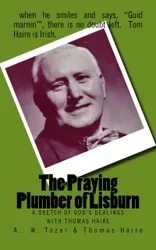Any man who has reason to hope (or to fear) that someone may someday write the story of his life would do well to pray that he may not fall into the hand of an enemy, a disciple, a rival or a relative.
Of all men, these make the poorest biographers. Their relationship to the subject places them where they cannot see him as he actually is, so the picture they paint, however interesting it may be, is never true to the original.
Our enemies seldom know us well enough to write about us. The person they think they know—and hate—is not the person we are. For that reason an enemy is likely to draw a caricature, and not a true likeness. He is sure to sketch in his prejudices and animosities, and may casually leave upon the forehead little careless projections which could not be proved to be, but might easily be mistaken for, horns.
A disciple will usually do as poor a job, from an artistic point of view, as an enemy, though for an altogether different reason. Instead of horns he may, with as little fidelity to the facts, sketch in a harp, but the result will be no better in the end. “Leave the warts in,” said Lincoln when about to sit for his portrait, and to the everlasting credit of the artist he had the courage to do it. But true disciples never see warts, or if one is called to their attention, they will argue that it is only a callous anyway, caused by a halo that had slipped down.
George Washington has the misfortune to be respected by everybody and loved by nobody. Parson Weems saw to that. He wrote a life of Washington that fixed a great gulf between him and every downright American from that day forward. The pretty boy with the cherry cheeks, the innocent little hatchet and the sententious manner of speech which Weems gave to the world can never excite the affections of sincere men and women. But I wonder whether Lincoln’s warts and his uncurried hair may not have created a secret bond of sympathy between him and two generations of American boys. No one wants a hero who is too perfect.
And where is that man who can write a fair biography of an acknowledged rival? It is not in human nature to do it. No matter how valiantly we may try, we cannot force ourselves to say all the good that ought to be said about a man when we know that every feather we put in his cap we must first take out of our own. That is why it is hard to get a fair appraisal of a public figure by a contemporary in his own field.
Our relatives know us better than anyone else does, but they are not safe biographers nevertheless. In the first place they are likely to be stone blind with pride and affection, (not to mention their uncomfortable habit of referring to us by little nicknames we hoped had been forgotten). The knowledge that one of their own blood and kin has actually attained to eminence acts like a draught of heady wine rendering them incapable of anything like sober judgment. By a well-known law of the human mind they praise themselves in their illustrious relative, so that what we get is a lot of left-handed boasting that does not come within shouting distance of the truth.
The best biographer comes from a far country. He can see the subject as he is, and being free from the handicap of a close personal relation, he will, if he have a fair amount of intelligence and enough patience to make himself familiar with the facts, be in a position to present a reasonably accurate picture of what he sees.
We feel that we bring to the task of writing this sketch of the life of Albert B. Simpson, if nothing more, a sympathetic heart and an objective mental approach. We belong to another generation than his, and thus stand back from the subject far enough to gain better perspective. We are not, and have never been his disciple, though common gratitude requires us to testify that we have received from his life and teachings, and more especially from his “spiritual songs,” such immeasurable benefits that we feel forever bound to thank the thoughtful God who gave him to the Church. Meditation upon his trials and triumphs easily brings tears close to the surface and disposes us to reverent prayer. Indeed it is hard to write dispassionately of one possessing the tremendous emotional appeal of A. B. Simpson. The sheer spiritual weight of the man crushes in upon us till we are overcome with it and, like Daniel, we “sit down astonied.” But in spite of this, we shall try to maintain a fair objectivity in our treatment of the subject matter which his life affords.
In preparing this work we but loose his shoe latchet, and acknowledge ourself blessed in the doing of it.











